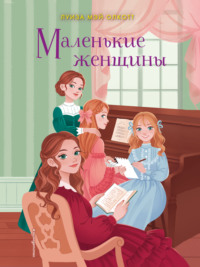 полная версия
полная версияLittle Men. Life at Plumfield with Jo's Boys
“It’s a beautiful plan,” said Nat, feeling that he should like to join in the fray, but not venturing to propose it the first night. So he lay enjoying the spectacle, which certainly was a lively one.
Tommy Bangs led the assailing party, and Demi defended his own room with a dogged courage, fine to see, collecting pillows behind him as fast as they were thrown, till the besiegers were out of ammunition, when they would charge upon him in a body, and recover their arms. A few slight accidents occurred, but nobody minded, and gave and took sounding thwacks with perfect good humor, while pillows flew like big snowflakes, till Mrs. Bhaer looked at her watch, and called out —
“Time is up, boys. Into bed, every man Jack, or pay the forfeit!”
“What is the forfeit?” asked Nat, sitting up in his eagerness to know what happened to those wretches who disobeyed this most peculiar, but public-spirited schoolma’am.
“Lose their fun next time,” answered Mrs. Bhaer. “I give them five minutes to settle down, then put out the lights, and expect order. They are honorable lads, and they keep their word.”
That was evident, for the battle ended as abruptly as it began – a parting shot or two, a final cheer, as Demi fired the seventh pillow at the retiring foe, a few challenges for next time, then order prevailed; and nothing but an occasional giggle, or a suppressed whisper, broke the quiet which followed the Saturday-night frolic, as Mother Bhaer kissed her new boy, and left him to happy dreams of life at Plumfield.
CHAPTER II
THE BOYS
While Nat takes a good long sleep, I will tell my little readers something about the boys, among whom he found himself when he woke up.
To begin with our old friends. Franz was a tall lad, of sixteen now, a regular German, big, blond, and bookish, also very domestic, amiable, and musical. His uncle was fitting him for college, and his aunt for a happy home of his own hereafter, because she carefully fostered in him gentle manners, love of children, respect for women, old and young, and helpful ways about the house. He was her right-hand man on all occasions, steady, kind, and patient; and he loved his merry aunt like a mother, for such she had tried to be to him.
Emil was quite different, being quick-tempered, restless, and enterprising, bent on going to sea, for the blood of the old vikings stirred in his veins, and could not be tamed. His uncle promised that he should go when he was sixteen, and set him to studying navigation, gave him stories of good and famous admirals and heroes to read, and let him lead the life of a frog in river, pond, and brook, when lessons were done. His room looked like the cabin of a man-of-war, for every thing was nautical, military, and ship shape. Captain Kyd was his delight, and his favorite amusement was to rig up like that piratical gentleman, and roar out sanguinary sea-songs at the top of his voice. He would dance nothing but sailors’ hornpipes, rolled in his gait, and was as nautical in conversation as his uncle would permit. The boys called him “Commodore,” and took great pride in his fleet, which whitened the pond and suffered disasters that would have daunted any commander but a sea-struck boy.
Demi was one of the children who show plainly the effect of intelligent love and care, for soul and body worked harmoniously together. The natural refinement which nothing but home influence can teach, gave him sweet and simple manners: his mother had cherished an innocent and loving heart in him; his father had watched over the physical growth of his boy, and kept the little body straight and strong on wholesome food and exercise and sleep, while Grandpa March cultivated the little mind with the tender wisdom of a modern Pythagoras, – not tasking it with long, hard lessons, parrot-learned, but helping it to unfold as naturally and beautifully as sun and dew help roses bloom. He was not a perfect child, by any means, but his faults were of the better sort; and being early taught the secret of self-control, he was not left at the mercy of appetites and passions, as some poor little mortals are, and then punished for yielding to the temptations against which they have no armor. A quiet, quaint boy was Demi, serious, yet cheery, quite unconscious that he was unusually bright and beautiful, yet quick to see and love intelligence or beauty in other children. Very fond of books, and full of lively fancies, born of a strong imagination and a spiritual nature, these traits made his parents anxious to balance them with useful knowledge and healthful society, lest they should make him one of those pale precocious children who amaze and delight a family sometimes, and fade away like hot-house flowers, because the young soul blooms too soon, and has not a hearty body to root it firmly in the wholesome soil of this world.
So Demi was transplanted to Plumfield, and took so kindly to the life there, that Meg and John and Grandpa felt satisfied that they had done well. Mixing with other boys brought out the practical side of him, roused his spirit, and brushed away the pretty cobwebs he was so fond of spinning in that little brain of his. To be sure, he rather shocked his mother when he came home, by banging doors, saying “by George” emphatically, and demanding tall thick boots “that clumped like papa’s.” But John rejoiced over him, laughed at his explosive remarks, got the boots, and said contentedly, “He is doing well; so let him clump. I want my son to be a manly boy, and this temporary roughness won’t hurt him. We can polish him up by and by; and as for learning, he will pick that up as pigeons do peas. So don’t hurry him.”
Daisy was as sunshiny and charming as ever, with all sorts of little womanlinesses budding in her, for she was like her gentle mother, and delighted in domestic things. She had a family of dolls, whom she brought up in the most exemplary manner; she could not get on without her little work-basket and bits of sewing, which she did so nicely, that Demi frequently pulled out his handkerchief to display her neat stitches, and Baby Josy had a flannel petticoat beautifully made by Sister Daisy. She liked to quiddle about the china-closet, prepare the salt-cellars, put the spoons straight on the table; and every day went round the parlor with her brush, dusting chairs and tables. Demi called her a “Betty,” but was very glad to have her keep his things in order, lend him her nimble fingers in all sorts of work, and help him with his lessons, for they kept abreast there, and had no thought of rivalry.
The love between them was as strong as ever; and no one could laugh Demi out of his affectionate ways with Daisy. He fought her battles valiantly, and never could understand why boys should be ashamed to say “right out,” that they loved their sisters. Daisy adored her twin, thought “my brother” the most remarkable boy in the world, and every morning, in her little wrapper, trotted to tap at his door with a motherly – “Get up, my dear, it’s ’most breakfast time; and here’s your clean collar.”
Rob was an energetic morsel of a boy, who seemed to have discovered the secret of perpetual motion, for he never was still. Fortunately, he was not mischievous, nor very brave; so he kept out of trouble pretty well, and vibrated between father and mother like an affectionate little pendulum with a lively tick, for Rob was a chatterbox.
Teddy was too young to play a very important part in the affairs of Plumfield, yet he had his little sphere, and filled it beautifully. Every one felt the need of a pet at times, and Baby was always ready to accommodate, for kissing and cuddling suited him excellently. Mrs. Jo seldom stirred without him; so he had his little finger in all the domestic pies, and every one found them all the better for it, for they believed in babies at Plumfield.
Dick Brown, and Adolphus or Dolly Pettingill, were two eight-year-olds. Dolly stuttered badly, but was gradually getting over it, for no one was allowed to mock him and Mr. Bhaer tried to cure it, by making him talk slowly. Dolly was a good little lad, quite uninteresting and ordinary, but he flourished here, and went through his daily duties and pleasures with placid content and propriety.
Dick Brown’s affliction was a crooked back, yet he bore his burden so cheerfully, that Demi once asked in his queer way, “Do humps make people good-natured? I’d like one if they do.” Dick was always merry, and did his best to be like other boys, for a plucky spirit lived in the feeble little body. When he first came, he was very sensitive about his misfortune, but soon learned to forget it, for no one dared remind him of it, after Mr. Bhaer had punished one boy for laughing at him.
“God don’t care; for my soul is straight if my back isn’t,” sobbed Dick to his tormentor on that occasion; and, by cherishing this idea, the Bhaers soon led him to believe that people also loved his soul, and did not mind his body, except to pity and help him to bear it.
Playing menagerie once with the others, some one said, “What animal will you be, Dick?”
“Oh, I’m the dromedary; don’t you see the hump on my back?” was the laughing answer.
“So you are, my nice little one that don’t carry loads, but marches by the elephant first in the procession,” said Demi, who was arranging the spectacle.
“I hope others will be as kind to the poor dear as my boys have learned to be,” said Mrs. Jo, quite satisfied with the success of her teaching, as Dick ambled past her, looking like a very happy, but a very feeble little dromedary, beside stout Stuffy, who did the elephant with ponderous propriety.
Jack Ford was a sharp, rather a sly lad, who was sent to this school, because it was cheap. Many men would have thought him a smart boy, but Mr. Bhaer did not like his way of illustrating that Yankee word, and thought his unboyish keenness and money-loving as much of an affliction as Dolly’s stutter, or Dick’s hump.
Ned Barker was like a thousand other boys of fourteen, all legs, blunder, and bluster. Indeed the family called him the “Blunderbuss,” and always expected to see him tumble over the chairs, bump against the tables, and knock down any small articles near him. He bragged a good deal about what he could do, but seldom did any thing to prove it, was not brave, and a little given to tale-telling. He was apt to bully the small boys, and flatter the big ones, and without being at all bad, was just the sort of fellow who could very easily be led astray.
George Cole had been spoilt by an over-indulgent mother, who stuffed him with sweetmeats till he was sick, and then thought him too delicate to study, so that at twelve years old, he was a pale, puffy boy, dull, fretful, and lazy. A friend persuaded her to send him to Plumfield, and there he soon got waked up, for sweet things were seldom allowed, much exercise required, and study made so pleasant, that Stuffy was gently lured along, till he quite amazed his anxious mamma by his improvement, and convinced her that there was really something remarkable in Plumfield air.
Billy Ward was what the Scotch tenderly call an “innocent,” for though thirteen years old, he was like a child of six. He had been an unusually intelligent boy, and his father had hurried him on too fast, giving him all sorts of hard lessons, keeping him at his books six hours a day, and expecting him to absorb knowledge as a Strasburg goose does the food crammed down its throat. He thought he was doing his duty, but he nearly killed the boy, for a fever gave the poor child a sad holiday, and when he recovered, the over-tasked brain gave out, and Billy’s mind was like a slate over which a sponge has passed, leaving it blank.
It was a terrible lesson to his ambitious father; he could not bear the sight of his promising child, changed to a feeble idiot, and he sent him away to Plumfield, scarcely hoping that he could be helped, but sure that he would be kindly treated. Quite docile and harmless was Billy, and it was pitiful to see how hard he tried to learn, as if groping dimly after the lost knowledge which had cost him so much. Day after day, he pored over the alphabet, proudly said A and B, and thought he knew them, but on the morrow they were gone, and all the work was to be done over again. Mr. Bhaer had infinite patience with him, and kept on in spite of the apparent hopelessness of the task, not caring for book lessons, but trying gently to clear away the mists from the darkened mind, and give it back intelligence enough to make the boy less a burden and an affliction.
Mrs. Bhaer strengthened his health by every aid she could invent, and the boys all pitied and were kind to him. He did not like their active plays, but would sit for hours watching the doves, would dig holes for Teddy till even that ardent grubber was satisfied, or follow Silas, the man, from place to place seeing him work, for honest Si was very good to him, and though he forgot his letters Billy remembered friendly faces.
Tommy Bangs was the scapegrace of the school, and the most trying little scapegrace that ever lived. As full of mischief as a monkey, yet so good-hearted that one could not help forgiving his tricks; so scatterbrained that words went by him like the wind, yet so penitent for every misdeed, that it was impossible to keep sober when he vowed tremendous vows of reformation, or proposed all sorts of queer punishments to be inflicted upon himself. Mr. and Mrs. Bhaer lived in a state of preparation for any mishap, from the breaking of Tommy’s own neck, to the blowing up of the entire family with gunpowder; and Nursey had a particular drawer in which she kept bandages, plasters, and salves for his especial use, for Tommy was always being brought in half dead; but nothing ever killed him, and he rose from every downfall with redoubled vigor.
The first day he came, he chopped the top off one finger in the hay-cutter, and during the week, fell from the shed roof, was chased by an angry hen who tried to pick his eyes out because he examined her chickens, got run away with, and had his ears boxed violently by Asia, who caught him luxuriously skimming a pan of cream with half a stolen pie. Undaunted, however, by any failures or rebuffs, this indomitable youth went on amusing himself with all sorts of tricks till no one felt safe. If he did not know his lessons, he always had some droll excuse to offer, and as he was usually clever at his books, and as bright as a button in composing answers when he did not know them, he got on pretty well at school. But out of school, – Ye gods and little fishes! how Tommy did carouse!
He wound fat Asia up in her own clothes line against the post, and left her there to fume and scold for half an hour one busy Monday morning. He dropped a hot cent down Mary Ann’s back as that pretty maid was waiting at table one day when there were gentlemen to dinner, whereat the poor girl upset the soup and rushed out of the room in dismay, leaving the family to think that she had gone mad. He fixed a pail of water up in a tree, with a bit of ribbon fastened to the handle, and when Daisy, attracted by the gay streamer, tried to pull it down, she got a douche bath that spoiled her clean frock and hurt her little feelings very much. He put rough white pebbles in the sugar-bowl when his grandmother came to tea, and the poor old lady wondered why they didn’t melt in her cup, but was too polite to say anything. He passed round snuff in church so that five of the boys sneezed with such violence they had to go out. He dug paths in winter time, and then privately watered them so that people should tumble down. He drove poor Silas nearly wild by hanging his big boots in conspicuous places, for his feet were enormous, and he was very much ashamed of them. He persuaded confiding little Dolly to tie a thread to one of his loose teeth, and leave the string hanging from his mouth when he went to sleep, so that Tommy could pull it out without his feeling the dreaded operation. But the tooth wouldn’t come at the first tweak, and poor Dolly woke up in great anguish of spirit, and lost all faith in Tommy from that day forth. The last prank had been to give the hens bread soaked in rum, which made them tipsy and scandalized all the other fowls, for the respectable old biddies went staggering about, pecking and clucking in the most maudlin manner, while the family were convulsed with laughter at their antics, till Daisy took pity on them and shut them up in the hen-house to sleep off their intoxication.
These were the boys, and they lived together as happily as twelve lads could, studying and playing, working and squabbling, fighting faults and cultivating virtues in the good old-fashioned way. Boys at other schools probably learned more from books, but less of that better wisdom which makes good men. Latin, Greek, and mathematics were all very well, but in Professor Bhaer’s opinion, self-knowledge, self-help, and self-control were more important, and he tried to teach them carefully. People shook their heads sometimes at his ideas, even while they owned that the boys improved wonderfully in manners and morals. But then, as Mrs. Jo said to Nat, it was an “odd school.”
CHAPTER III
SUNDAY
The moment the bell rang next morning Nat flew out of bed, and dressed himself with great satisfaction in the suit of clothes he found on the chair. They were not new, being half-worn garments of one of the well-to-do boys; but Mrs. Bhaer kept all such cast-off feathers for the picked robins who strayed into her nest. They were hardly on when Tommy appeared in a high state of clean collar, and escorted Nat down to breakfast.
The sun was shining into the dining-room on the well-spread table, and the flock of hungry, hearty lads who gathered round it. Nat observed that they were much more orderly than they had been the night before, and every one stood silently behind his chair while little Rob, standing beside his father at the head of the table, folded his hands, reverently bent his curly head, and softly repeated a short grace in the devout German fashion, which Mr. Bhaer loved and taught his little son to honor. Then they all sat down to enjoy the Sunday-morning breakfast of coffee, steak, and baked potatoes, instead of the bread and milk fare with which they usually satisfied their young appetites. There was much pleasant talk while the knives and forks rattled briskly, for certain Sunday lessons were to be learned, the Sunday walk settled, and plans for the week discussed. As he listened, Nat thought it seemed as if this day must be a very pleasant one, for he loved quiet, and there was a cheerful sort of hush over every thing that pleased him very much; because, in spite of his rough life, the boy possessed the sensitive nerves which belong to a music-loving nature.
“Now, my lads, get your morning jobs done, and let me find you ready for church when the ’bus comes round,” said Father Bhaer, and set the example by going into the school-room to get books ready for the morrow.
Every one scattered to his or her task, for each had some little daily duty, and was expected to perform it faithfully. Some brought wood and water, brushed the steps, or ran errands for Mrs. Bhaer. Others fed the pet animals, and did chores about the barn with Franz. Daisy washed the cups, and Demi wiped them, for the twins liked to work together, and Demi had been taught to make himself useful in the little house at home. Even Baby Teddy had his small job to do, and trotted to and fro, putting napkins away, and pushing chairs into their places. For half an hour the lads buzzed about like a hive of bees, then the ’bus drove round, Father Bhaer and Franz with the eight older boys piled in, and away they went for a three mile drive to church in town.
Because of the troublesome cough Nat preferred to stay at home with the four small boys, and spent a happy morning in Mrs. Bhaer’s room, listening to the stories she read them, learning the hymn she taught them, and then quietly employing himself pasting pictures into an old ledger.
“This is my Sunday closet,” she said, showing him shelves filled with picture-books, paint-boxes, architectural blocks, little diaries, and materials for letter-writing. “I want my boys to love Sunday, to find it a peaceful, pleasant day, when they can rest from common study and play, yet enjoy quiet pleasures, and learn, in simple ways, lessons more important than any taught in school. Do you understand me?” she asked, watching Nat’s attentive face.
“You mean to be good?” he said, after hesitating a minute.
“Yes; to be good, and to love to be good. It is hard work sometimes, I know very well; but we all help one another, and so we get on. This is one of the ways in which I try to help my boys,” and she took down a thick book, which seemed half-full of writing, and opened at a page on which there was one word at the top.
“Why, that’s my name!” cried Nat, looking both surprised and interested.
“Yes; I have a page for each boy. I keep a little account of how he gets on through the week, and Sunday night I show him the record. If it is bad I am sorry and disappointed, if it is good I am glad and proud; but, whichever it is, the boys know I want to help them, and they try to do their best for love of me and Father Bhaer.”
“I should think they would,” said Nat, catching a glimpse of Tommy’s name opposite his own, and wondering what was written under it.
Mrs. Bhaer saw his eye on the words, and shook her head, saying, as she turned a leaf —
“No, I don’t show my records to any but the one to whom each belongs. I call this my conscience book; and only you and I will ever know what is to be written on the page below your name. Whether you will be pleased or ashamed to read it next Sunday depends on yourself. I think it will be a good report; at any rate, I shall try to make things easy for you in this new place, and shall be quite contented if you keep our few rules, live happily with the boys, and learn something.”
“I’ll try, ma’am;” and Nat’s thin face flushed up with the earnestness of his desire to make Mrs. Bhaer “glad and proud,” not “sorry and disappointed.” “It must be a great deal of trouble to write about so many,” he added, as she shut her book with an encouraging pat on the shoulder.
“Not for me, for I really don’t know which I like best, writing or boys,” she said, laughing to see Nat stare with astonishment at the last item. “Yes, I know many people think boys are a nuisance, but that is because they don’t understand them. I do; and I never saw the boy yet whom I could not get on capitally with after I had once found the soft spot in his heart. Bless me, I couldn’t get on at all without my flock of dear, noisy, naughty, harum-scarum little lads, could I, my Teddy?” and Mrs. Bhaer hugged the young rogue, just in time to save the big inkstand from going into his pocket.
Nat, who had never heard anything like this before, really did not know whether Mother Bhaer was a trifle crazy, or the most delightful woman he had ever met. He rather inclined to the latter opinion, in spite of her peculiar tastes, for she had a way of filling up a fellow’s plate before he asked, of laughing at his jokes, gently tweaking him by the ear, or clapping him on the shoulders, that Nat found very engaging.
“Now, I think you would like to go into the school-room and practise some of the hymns we are to sing to-night,” she said, rightly guessing the thing of all others that he wanted to do.
Alone with the beloved violin and the music-book propped up before him in the sunny window, while Spring beauty filled the world outside, and Sabbath silence reigned within, Nat enjoyed an hour or two of genuine happiness, learning the sweet old tunes, and forgetting the hard past in the cheerful present.
When the church-goers came back and dinner was over, every one read, wrote letters home, said their Sunday lessons, or talked quietly to one another, sitting here and there about the house. At three o’clock the entire family turned out to walk, for all the active young bodies must have exercise; and in these walks the active young minds were taught to see and love the providence of God in the beautiful miracles which Nature was working before their eyes. Mr. Bhaer always went with them, and in his simple, fatherly way, found for his flock “Sermons in stones, books in the running brooks, and good in every thing.”
Mrs. Bhaer with Daisy and her own two boys drove into town, to pay the weekly visit to Grandma, which was busy Mother Bhaer’s one holiday and greatest pleasure. Nat was not strong enough for the long walk, and asked to stay at home with Tommy, who kindly offered to do the honors of Plumfield. “You’ve seen the house, so come out and have a look at the garden, and the barn, and the menagerie,” said Tommy, when they were left alone with Asia, to see that they didn’t get into mischief; for, though Tommy was one of the best-meaning boys who ever adorned knickerbockers, accidents of the most direful nature were always happening to him, no one could exactly tell how.









